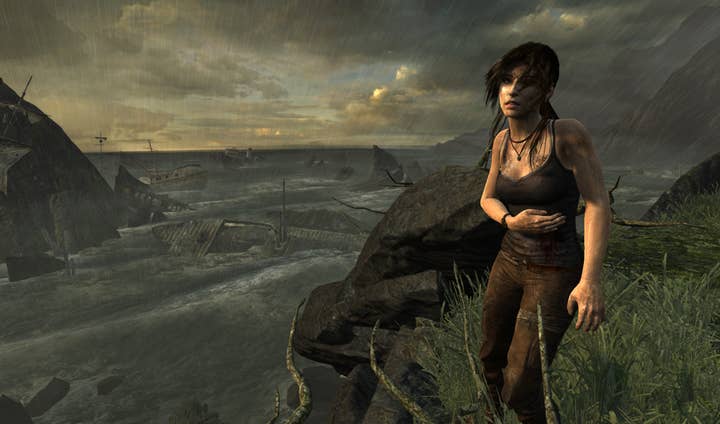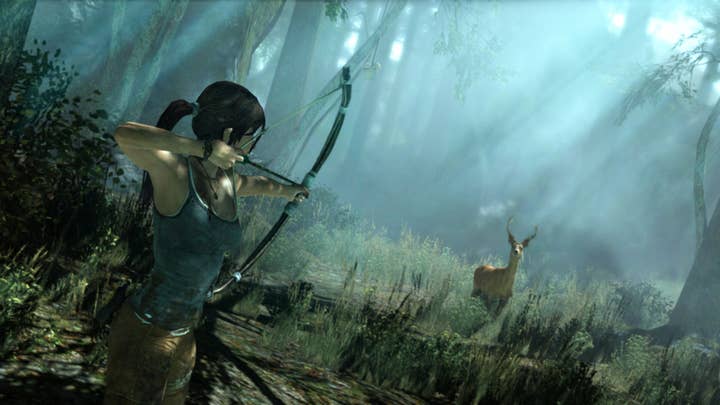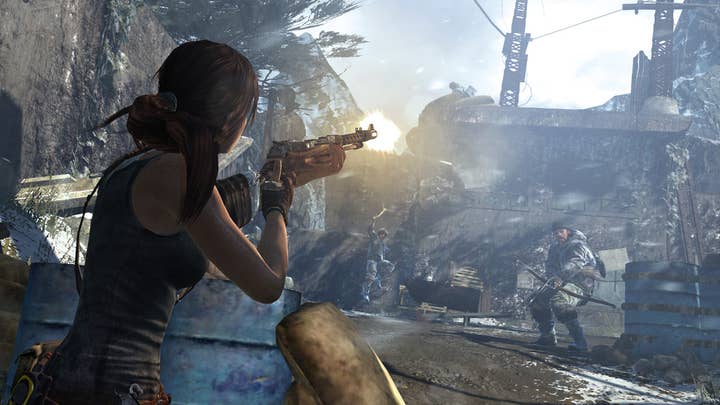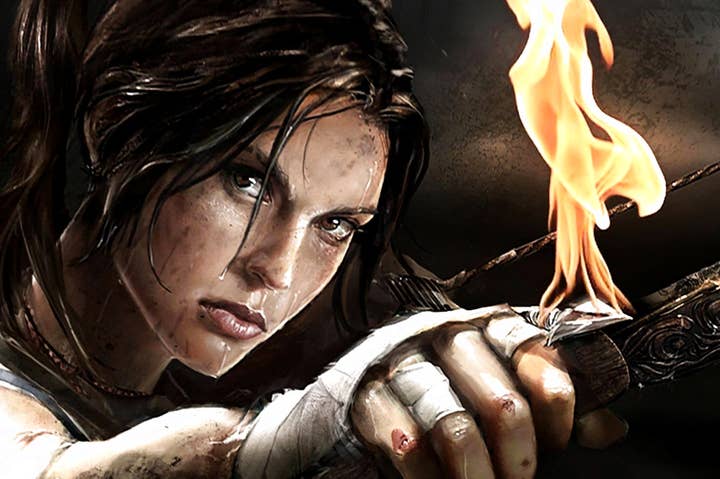Post-Mortem: Tomb Raider
How do you add depth to one of 3D gaming's pioneers?
We've seen a lot of fresh starts in the last few years: reboots, relaunches, rebrands and the cringe-inducing remaginations. It's a natural cycle, especially in an industry where popular IP is worth its weight in gold. Much of this has been a result of the phenomenon of Kickstarter, which has seen plenty of dusty boxes pulled out of the industry's attic for a profitable spring clean, but there's a big difference between that and a reboot for a AAA icon like Lara Croft.
Since Crystal Dynamics took the helm in 2006, Lara has put in some solid performances, and made a brief foray into the digital-only realm with the downloadable Guardian of Light, but while those games earned favourable comparison to some of her previous adventures, she's never really regained the sense of discovery and freshness that once made her games so unique.
Things have moved on around her, of course. For a start, she no longer has a monopoly on the acrobatic, wise-cracking antiquarian genre, thanks to a certain descendant of the British admiralty. Nathan Drake, draped in Holywood glamour and accompanied by a sharp script and a wry smile, has eclipsed her somewhat - despite owing her more than a little inspiration.
So the student becomes the master, but as any teacher who's got the energy left for a conversation will tell you, you can also learn a lot standing at the front of a classroom. Crystal Dynamics has embraced that opportunity fully, and Tomb Raider has picked up a few new tricks from the Naughty Dog. There's nothing wrong with that, but there's also always a chance that, when you turn up to a party wearing the same dress as someone else, you won't be the one to wear it best.
Read on as Matthew Handrahan and Dan Pearson ponder this return of the grand dame of 3D platforming, and see if she's gained any true depth in the process.

Daniel Pearson: I'll tell you something, but don't let it become common knowledge. I've never really played a Tomb Raider game before.
I don't know why. I love exploration and problem solving. I've owned the platforms they've been released on, read the stellar reviews, and even played one or two for a few minutes at friends' houses, but I've never sat down and given one the time of day. I think, in some ways, I was dissuaded by the aura of teen smut that surrounded Lara - as generated by the games, the models and the culture surrounding them. There has always been something about her that brings to mind the stereotypical grunting man-gamer, getting his kicks by slapping her into walls or feeding her to T-Rex. Maybe I just had some very stereotypical friends.
"There has always been something about Lara Croft that brings to mind the stereotypical grunting man-gamer, getting his kicks by feeding her to T-Rex"
And with all of the brouhaha surrounding this reboot - and I am of the opinion that it was poor quote management and some insensitive PR rather than anything mendacious or intentionally misogynistic - I had started to assume the worst. I didn't really want to press A to not be raped, or watch a scared and injured young person have sharpened poles embedded in her skull. I'm not squeamish, nor am I afraid of dark or difficult games, but initially this sounded grim.
The more I saw, though, the more intrigued I became. Reading about Rhianna Pratchett's intentions for the script made me believe that there would be at least some progress towards a sensible narrative and the evolution of Lara to a fully fleshed out character rather than just fully fleshed. Poorly-judged developer sound-bites aside, Tomb Raider might actually be a genuine attempt to create a female character with depth and personality, and that's rare enough to at least take a look at.
Then, finally, I realised that I'd been making all these judgements based on half-truths and second-hand accounts. If they've named a road in Derby after her, I reasoned, then she must be at least as interesting as Brian Clough. It also helped that I'd just bought a new PC, and I couldn't justify that if all I was going to do was play roguelikes on it.
So I started playing yesterday. I didn't stop for the next five or so hours, and not once did I intentionally kill, injure or even endanger Lara. (Full disclosure, I do this quite a lot on any game that frustrates me. There's nothing quite so cathartic as standing the source of your woes next to a fizzing grenade or in front of a charging Tigrex.) I had - and I know exactly how insipidly musing this sounds and hate myself for it appropriately - developed quite a fondness for her. I don't mean that in an arched-eyebrows nudge-nudge, wink-wink manner either, nor a 'me big-man who protect tiny lady' kind of white-knight sense. I just, I don't know, like her. She fucks things up, she falls over. She makes mistakes and she shows uncertainty. She seems, as so few gaming icons are, at least a little bit human.
Matthew Handrahan: Like you, Dan, I have no emotional stake in the fate of the Tomb Raider franchise. I played the early games, and while I liked them in concept they seemed to be locked in a battle with the limitations of the hardware. Noticing an approaching wolf before it pounced or spotting the one handhold necessary for Lara to scale a wall and make her escape felt unjustly difficult with the muddy, low-res textures of the first PlayStation. Tomb Raider seemed to be waiting for the crisp fidelity of high-definition, and so it proved - casting those rose-tinted glasses to one side, I had a much better time playing Crystal Dynamics' under-appreciated Tomb Raider: Underworld than any previous game in the series.
"In those opening hours, Crystal Dynamics does a superlative job of establishing Lara as the antithesis of the hyper-confident, lantern-jawed Nathan Drake archetype"
Even so, I wasn't expecting to like Tomb Raider as much as I did. In those opening hours, Crystal Dynamics and Rhianna Pratchett do a superlative job of capturing Lara's initial distress, skilfully establishing her as the antithesis of the hyper-confident, lantern-jawed Nathan Drake archetype - helped in no small part by excellent voice-work from Camilla Luddington. The polish applied to Uncharted's dialogue obscured how conventional its premise, plot and characters really were, and while Tomb Raider is nothing we haven't seen in countless films and books, narrative video games rarely spend any time at all ruminating on doubt or weakness or defeat.
When the controversy around the scenes of apparent sexual assault in the game's E3 demo started to gather momentum, I was shocked. As you pointed out, the only real slip up was a poorly phrased developer sound-bite, but that was hastily rolled into a needless discussion about whether games are able to tackle such sensitive subject matter at all. My view on this is fairly consistent: of course they are, and developers should be given the chance to get the execution right before they are condemned for even trying. In my opinion, Crystal Dynamics has done just that, amplifying the sense of threat in a way that builds the character rather than exploits her.
But, inevitably, it doesn't last. In any game with such an evidently huge budget, concessions must be made to hold the attention of the widest possible market, and before long Lara Croft is handed the first of many guns, and stumbles across the first of many shallow collectibles. It's all good entertainment, but as the game goes on the moments of real inspiration are fewer and further between. For me, Tomb Raider never quite recaptured the enthralling trepidation of those desperate first hours.

Dan Pearson: You're right, Luddington's voice work does make a huge difference - she swears particularly brilliantly. (I've decided I really like the swearing.) She's also not always in hero mode - a lot of the time she sounds pissed off or hurt or just really tired. That's incredibly important when you're going for any sort of nuanced character, and it's nailed here nine times out of ten.
There's much more subtlety to a lot of Tomb Raider than I was expecting overall, actually - a lot of self-deprecation and straight up piss taking that hits just the right notes of fourth-wall breaking and character development at the same time. It's a smart main script, but there's equal merit in many of the throwaway lines, and Luddington's isn't the only excellent voice on-board.
"When Lara's just survived being set on fire and stabbed in the back with a pick-axe, there's something odd about her nursing a flesh wound in her shoulder during a cut-scene"
Another excellent thing I've noticed, and this might just be me gushing slightly over a new PC, is the way that almost no matter when you pause the game, the vignette that flashes in with the menu on it frames the current scene perfectly. Almost every one looks, depending on the scenario, like an idyllic postcard from a backpacker or the front-page shot which cost an intrepid war reporter their life. It's the first game in years for which I've wanted a picture mode. I mean, there might be one - I haven't actually checked or anything.
A few things have started to grate, though, just a little, and it sounds like I'm not alone from what you've mentioned. As far as I can tell, one of the reasons that so few games develop believable characters and storylines is that it's almost impossible to create a seamless flow between the agency of the player and the writer. So, for every cut-scene in which Lara digs a little deeper, finding the grit to pull herself back from near fatal injury and climb just one more mountain, surviving on pure willpower alone, there'll be fifteen minutes of gameplay where I'm clumsily crouching behind a wicker gate while a laughing brigand aerates me with an AK47.
There's no countering that while maintaining any sort of player freedom, really, and in fact it works a little better because Lara is supposed to make mistakes: it makes my inability to judge angle or distance all the more canon. However, when she's just survived being set on fire, shot in the face and stabbed in the back with a pick-axe, there's something odd about her nursing a flesh wound in her shoulder during a cut-scene.
Still, it's saying something that, at one point, when you're forced into a low-ceilinged traverse full of filthy water, I was momentarily genuinely concerned about her getting one of her wounds infected. I knew it couldn't happen, but it actually made me hesitate before I jumped in. I guess nobody wants to watch an on-screen character spend 48 hours dying of gangrene or having to press X to mask the sound of explosive diarrhoea every two minutes.
Now. One thing that is annoying me. And it's annoying me that it's annoying me, because it's all completely optional and actually not really that annoying when you think about it. Let's talk about collectibles.
Matthew Handrahan: Dan, they annoy me, too, and I suspect we're not alone.
"Tomb Raider's collectibles are merely the shadow of meaningful content, and they undermine the intoxicating atmosphere that Crystal Dynamics has so skilfully created"
The existence of distractions within a game world can add variety, reward exploration, and generally offer real value to the player, so why is that so rarely the case? Only the Riddler Trophies in Arkham Asylum and Arkham City leap to mind as collectibles that offered more than a brief scratch of the obsessive-compulsive itch, but Tomb Raider scarcely even tries to disguise the banality of its myriad trinkets and chores. Burning posters, lighting candles, shooting gas-lamps, smashing crates; every new area is pock-marked with meta-activities that require almost no ingenuity, or even interaction, on the part of the player. It's not like they break or spoil the game, but they are merely the shadow of meaningful content, and they undermine the intoxicating atmosphere that Crystal Dynamics has so skilfully created.
It really feels like 'me too' thinking in a game that, for the most part, manages the not inconsiderable feat of retaining a sense of its own identity. For me, the AAA console industry's obsession with making every game a buffet of things to see and do has created a homogeneity in its products; disparate games united in their quest to balloon playing times and appeal to the basest gaming instincts. Tomb Raider is far from the worst offender - that would be Assassin's Creed - but something tells me that Rhianna Pratchett would wait until at least her second playthrough to find all of the GPS caches.
I have essentially the same problem with the game's increasing reliance on gunplay. I'm just about sick of reading reviews that highlight the 'ludo-narrative dissonance' in games like Uncharted, where the hero is both god-like saviour and murderous psycho at exactly the same time. It's a thematic problem with virtually every games that has ever tried to tell a story - a huge issue that the entire industry must address - and, as such, it's a trite criticism to level at an individual product. No, the shooting doesn't alter my view of Lara's character one little bit, but it does make the game feel more ordinary - a little bit more like everything else when so much about it feels unique.

Dan Pearson: I'd agree about the relevance of collectibles - they're disappointingly trite when they could have at least had a little more plot significance. Granted, the relics and the documents offer some insight into backstory and the history of Yamatai, but by the time you near the end of the game you can tell that they've run out of ideas for the 'perform N of X' tasks. I mean, stopping in the middle of a pitched gun battle to pick a mushroom or burn a sack of rubbish is less trivial and more absurd, to my mind.
Still, this is videogames, and we're all used to this now. Little devices to push you around otherwise unexplored areas of scenery, or virtual breadcrumbs leading you up narrative paths to a gingerbread house of upgrades or enemies are par for the course, albeit a course we know like the back of our hands. But a more substantial reward than small amount of XP would have been nice to see; partly because it makes no sense that Lara learns as much about combat, climbing and herself from lighting lanterns as she does from zip-lining through an abandoned temple into an enfilade of shotgun fire, and partly because if you go back to those chores once you've finished the main story then the experience they offer is of no use whatsoever. If collecting mushrooms had enabled me to turn arrows into long-range hallucinogen hypodermics instead, I'd have spent a lot more time and energy foraging for them. And, without raising any spoilers, the actual raiding of tombs is exceedingly sparse here, with each optional crypt delve amounting to little more than a single puzzle and jimmying open a chest. It's referenced away in another fourth-wall stroking aside, but it would have been nice to see a bit more imagination here.
"The occasional tugs on the heartstrings are disappointingly brief, but that's better than ending up with a maudlin concerto that's all strings and no brass"
Still, I feel I'm straying a little into unfairly critical territory here. I've seen Tomb Raider described as 'bloated' and 'overstretched' because of these side-jaunts, skill-trees and upgrade systems, but I think that's a little churlish. This is still very much a story about the characters, and the reinvention of an iconic heroine in particular, and it does that extremely well, pacing sections of pure, breakneck action script, free-form exploration and the occasional opportunity for quiet reflection with real aplomb. The occasional tugs on the heartstrings are disappointingly brief, but it's better to have erred on the side of caution in this way than to end up with a maudlin concerto that is all strings and no brass.
I haven't finished it yet, because I've actually been trying to savour it - a luxury I rarely afford myself. I've also only just pumped the settings up to full, which has dropped the frame-rate down to about 40, but has made everything look even more sumptuous, especially some of the lighting. It also might just give me the necessary impetus to go on the sort of post-completion sight-seeing tour that Evan Narcisse talked about in his Kotaku piece. I'll say it again, I like this Lara and I might even miss her a bit when she's gone into the digital ether. Which does make me think: if this is her origin story, her journey from potential to actual, what's she going to be like when she inevitably returns?
Matthew Handrahan: That's the creative conundrum posed by the origin story. Generally speaking, the decision to return to a character's roots arrives when both the creative and commercial wells are deemed to have run dry. The cocksure, trigger-happy Lara Croft is one of the few iconic figures in video games, but even icons are subject to diminishing returns. Crystal Dynamics has done as good a job of adding depth and context to that character as anyone had dared hope, but in doing so it has created an entirely new problem.
The resurrection of James Bond in the trilogy of films that began with Casino Royale and ended with Skyfall is a helpful comparison. I enjoyed all three films well enough, but while the climax of Skyfall felt satisfyingly definitive, all of the time and effort invested in filling out James Bond's backstory - adding a little humanity to his icy efficacy - really only led the character back to where his problems began. Ultimately, the next film will, more or less, be the James Bond we knew, loved and got a bit bored of 10 years ago.
Obviously, there's no way to know what's in store for Tomb Raider's inevitable sequel, but enough blanks have now been filled in to raise slight concern over what's ahead. No doubt it will be a visually splendid and supremely polished action game, but they aren't all that difficult to find, while measured studies of fallible protagonists are one of the rarest pleasures in gaming. By the end of Tomb Raider, Lara Croft had changed to the point where the next game could easily revert to type and remain entirely plausible. That may not be Crystal Dynamics' plan, of course, but the self-doubt and heartfelt moralising that made this game so memorable won't seem nearly as coherent next time.
Wise-cracks and figure-hugging outfits are not without a certain appeal, but gaming already has one Nathan Drake. Now that Lara has been handed a grenade launcher, is it really possible to take it back?

